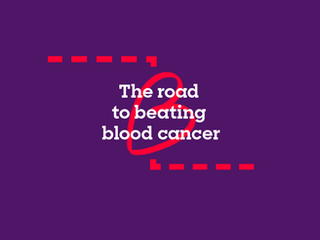Lymphoma
Lymphoma is a type of blood cancer that affects white blood cells called lymphocytes.

What is lymphoma?
Lymphoma is a type of blood cancer that affects the immune system. It specifically affects white blood cells called lymphocytes, which are an important part of your immune system. Lymphoma is also called a cancer of the lymphatic system, or lymphatic cancer.
In lymphoma, something goes wrong with the development of your lymphocytes. The lymphocytes don’t work properly and can multiply out of control.
There are two main types of lymphoma – Hodgkin lymphoma and non-Hodgkin lymphoma. Both types affect your lymphocytes.
Over 14,000 people are diagnosed with lymphoma each year in the UK, making it the most common blood cancer.
Lymphoma causes
In most cases we don’t know what causes lymphoma, but there are some things which can make the risk of developing the disease slightly higher:
- age
- sex
- family history
- lowered immunity
- infections.
Lymphoma symptoms
A common lymphoma symptom is lumps. These are swollen lymph nodes (glands). You may get painless swellings in your neck, collarbone, armpit, groin or other parts of your body.
Some swollen lymph nodes can press on organs and cause pain in your chest, coughing, breathlessness, or pain in your stomach area.
Other lymphoma symptoms include:
- fever (high temperature)
- weight loss that is unexplained
- night sweats that soak your clothes and bedding.
We have more detailed information about lymphoma symptoms in general, and for specific types of lymphoma – see Lymphoma types below.
Lymphoma types
There are different types of lymphoma depending on how the cells are affected and how the lymphoma behaves. We have more detailed information on different types of lymphoma:
Non-Hodgkin lymphomas that are fast-growing:
- Burkitt lymphoma
- diffuse large B cell lymphoma (DLBCL)
- mantle cell lymphoma
- primary central nervous system lymphoma (PCNSL)
Non-Hodgkin lymphomas that are slow-growing:
Tests for lymphoma can help your doctor diagnose you. These include blood tests, lymph node biopsies, scans, and general health and infection screening.
If you've just been told you have lymphoma
Use our simple online tool to get information and support tailored to you.
Answer some quick questions, and you'll get clear information, tips and support to download and keep.

Lymphoma treatment
Lymphoma treatments can vary depending on the type of lymphoma you have, how far it has spread (its stage) and whether you have symptoms. Lymphoma treatments include:
- chemotherapy
- radiotherapy
- targeted therapies
- CAR T-cell therapy.
If you have a slow-growing lymphoma, you may not need treatment straight away, and some people never need it. This is called being on active monitoring.
Lymphoma treatments can have side effects. Some people experience some of these effects as a result of the lymphoma itself, even if they aren't having treatment.
If someone you love has been diagnosed
You might find our information for family and friends helpful. It covers:
- how to support someone with blood cancer
- practical tips
- coping with your own emotions
- real stories from other friends and family members.
You may also want to watch or listen to Blood Cancer Heart to Heart, featuring honest conversations between people who know what it's like to have a loved one diagnosed with blood cancer.
Lymphoma prognosis
Some people will want to know how lymphoma will affect their future – this is known as your prognosis.
Your prognosis is individual to you and depends the type of lymphoma you have, what treatments you can have, and other things like your general fitness.
People often want to know about survival rates for lymphoma. Survival rates are statistics that show how many people in a large group survive lymphoma for a certain period of time. These are only averages that can't tell you what will happen to you personally so many people find them unhelpful to focus on.
Ask your hospital team about your prognosis if you want to know, because everyone is different. Your hospital team knows you and your individual situation.
Remember, your prognosis can also change over time, for example if you respond well to lymphoma treatment. Read our general information about things that might affect your prognosis.
You might find it difficult understanding or thinking about prognosis. Our Support Service is here to talk you through it, offer support, or simply listen.

The road to beating lymphoma
From the introduction of antibody treatments, to modern day CAR-T therapy, Professor Peter Johnson looks at how scientists have successfully targeted lymphoma, and how they'll bring about the day when no one dies of it.
Lymphoma research and clinical trials
Lymphoma clinical trials are how we find new treatments and improve current ones. We can help you find out about clinical trials for lymphoma. Even if you just want to know a bit more about lymphoma research, contact our Clinical Trials Support Service.
Our previous research into lymphoma has focused on improving lymphoma treatments. Read about our research impact on lymphoma.
Young adults and lymphoma
Lymphoma is one of the most common cancers in young adults. Hear what Hinna, Leanne, Jamie and Emily say about the shock of being diagnosed with blood cancer:
Find more videos and information for young adults, covering diagnosis, treatment, side effects, the mental impact, friends and work or study.
